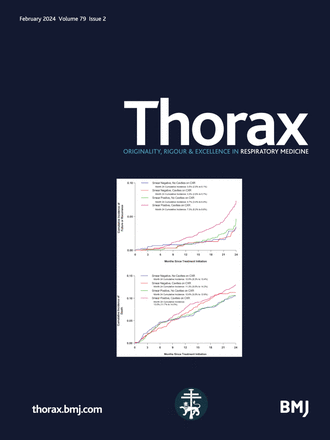Bacterial multiplex polymerase chain reaction tests for the diagnosis and management of pneumonia: ready for prime time?
IF 7.7
1区 医学
Q1 RESPIRATORY SYSTEM
引用次数: 0
Abstract
Background The diagnosis and management of pneumonia is often challenging due to its overlapping clinical presentations with other respiratory illnesses, low pathogen identification rates, and slow turnaround time of conventional bacterial cultures. These factors contribute to both inadequate empiric therapy and overuse of broad-spectrum antibiotics, which can negatively impact outcomes. Recently, multiplex polymerase chain reaction (mPCR) assays capable of rapidly detecting multiple bacterial respiratory pathogens and resistance genes have emerged. However, their clinical utility in pneumonia management remains uncertain. Objective To assess the utility of bacterial mPCR assays in pneumonia diagnosis, their impact on antimicrobial usage, and their effect on patient outcomes. Methods A comprehensive literature review was conducted using MEDLINE to identify observational studies and randomised controlled trials (RCTs) evaluating the accuracy and clinical impact of bacterial mPCR tests for pneumonia. Results Bacterial mPCR assays demonstrate high sensitivity for pathogen detection, rapid turnaround compared to conventional cultures, and the ability to identify many common resistance genes. They may also improve pathogen detection in patients who received empirical antibiotics prior to specimen collection. However, mPCRs do not detect all potential pathogens, cannot reliably differentiate colonisation from infection, and may show discordance between genetic and phenotypic resistance. mPCR panels also generally require lower respiratory tract specimens, limiting their utility since many pneumonia patients cannot produce adequate sputum. Observational studies and RCTs suggest that mPCR may help optimise antibiotic selection, but RCTs have not clearly demonstrated reductions in overall antibiotic use or improved clinical outcomes including mortality. Implementation of mPCR without structured antimicrobial stewardship may limit clinical impact. Conclusions Bacterial mPCR assays offer rapid and sensitive pathogen detection, but their integration into pneumonia management requires careful consideration of clinical context and expert antimicrobial stewardship guidance. Future research should focus on optimising their diagnostic and therapeutic applications, evaluating cost-effectiveness, and assessing patient-centered outcomes.细菌多重聚合酶链反应试验用于肺炎的诊断和管理:准备好了吗?
背景肺炎的诊断和治疗往往具有挑战性,因为它与其他呼吸道疾病的临床表现重叠,病原体识别率低,传统细菌培养的周转时间慢。这些因素导致经验性治疗不充分和广谱抗生素的过度使用,这可能对结果产生负面影响。近年来,能够快速检测多种细菌呼吸道病原体和耐药基因的多重聚合酶链反应(mPCR)检测方法已经出现。然而,它们在肺炎治疗中的临床应用仍不确定。目的评价细菌mPCR检测在肺炎诊断中的应用、对抗菌药物使用的影响以及对患者预后的影响。方法使用MEDLINE进行全面的文献综述,以确定观察性研究和随机对照试验(rct),以评估细菌mPCR检测肺炎的准确性和临床影响。结果与常规培养相比,细菌mPCR检测具有较高的病原体检测灵敏度,快速周转,能够鉴定出许多常见的耐药基因。它们还可以改善在标本采集前接受经验性抗生素治疗的患者的病原体检测。然而,mPCRs不能检测到所有潜在的病原体,不能可靠地区分定植和感染,并且可能显示遗传和表型抗性之间的不一致。mPCR检查通常也需要下呼吸道标本,这限制了其效用,因为许多肺炎患者不能产生足够的痰。观察性研究和随机对照试验表明,mPCR可能有助于优化抗生素的选择,但随机对照试验尚未明确证明总体抗生素使用减少或改善包括死亡率在内的临床结果。没有结构化抗菌药物管理的mPCR实施可能会限制临床影响。结论:细菌mPCR检测方法可以快速、灵敏地检测出病原体,但将其纳入肺炎管理需要仔细考虑临床情况和专业的抗菌药物管理指导。未来的研究应侧重于优化其诊断和治疗应用,评估成本效益,评估以患者为中心的结果。
本文章由计算机程序翻译,如有差异,请以英文原文为准。
求助全文
约1分钟内获得全文
求助全文
来源期刊

Thorax
医学-呼吸系统
CiteScore
16.10
自引率
2.00%
发文量
197
审稿时长
1 months
期刊介绍:
Thorax stands as one of the premier respiratory medicine journals globally, featuring clinical and experimental research articles spanning respiratory medicine, pediatrics, immunology, pharmacology, pathology, and surgery. The journal's mission is to publish noteworthy advancements in scientific understanding that are poised to influence clinical practice significantly. This encompasses articles delving into basic and translational mechanisms applicable to clinical material, covering areas such as cell and molecular biology, genetics, epidemiology, and immunology.
 求助内容:
求助内容: 应助结果提醒方式:
应助结果提醒方式:


